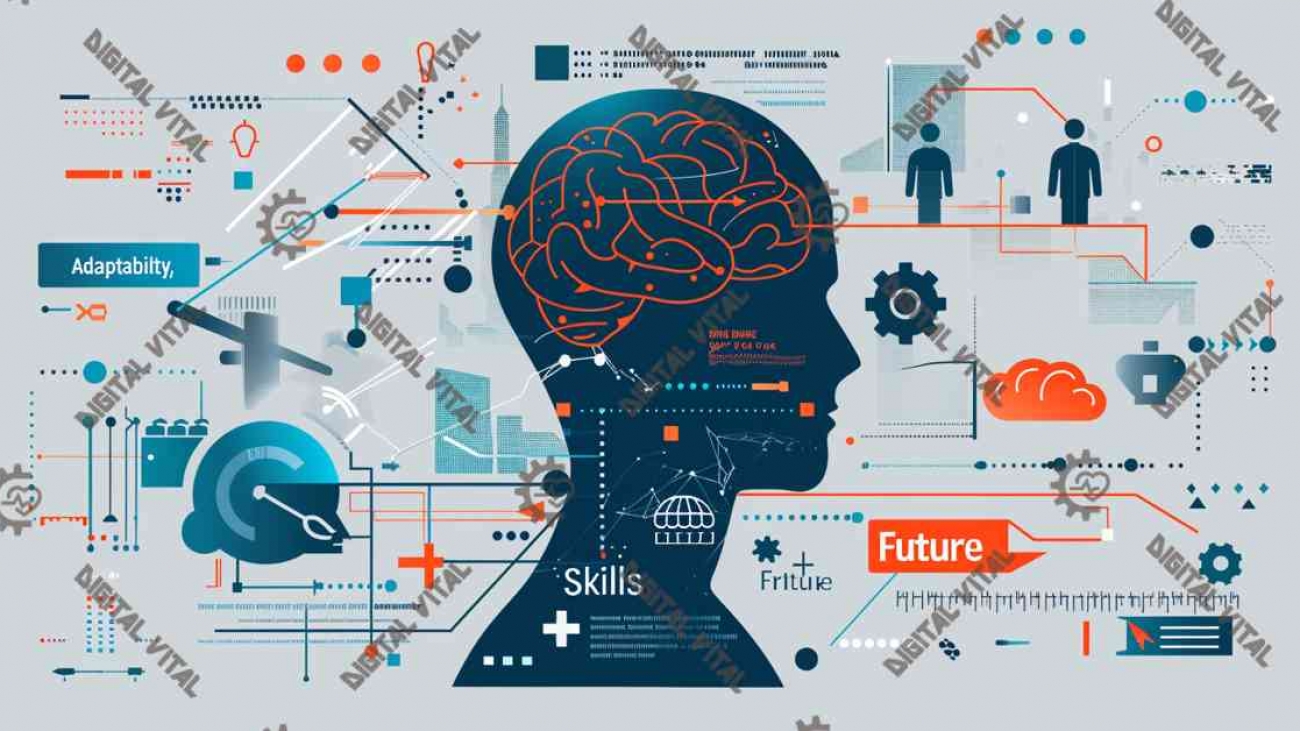The job market is evolving rapidly, influenced by technological advancements and shifting industry needs. As automation and artificial intelligence (AI) reshape traditional roles, certain soft skills are becoming increasingly valuable. These skills are essential for thriving in the high-paying jobs of the near future. This article explores the top 10 critical soft skills necessary for the job market in the next 5 to 10 years, highlighting trends and projections for future job opportunities.
Keywords: soft skills, job trends, future of work, essential skills, career development
Table of Contents
Essential Soft Skills
Adaptability
As the workplace undergoes rapid transformation, adaptability has emerged as a critical soft skill for career success. The ability to adjust quickly to new conditions, learn novel technologies, and pivot strategies to meet evolving demands sets adaptable employees apart. In a landscape where change is the only constant, companies value individuals who can navigate ambiguity and respond to unexpected challenges with ease.
Importance of Adaptability
Adaptability is essential because it enables employees to stay relevant in an ever-changing job market. Organizations are constantly evolving to maintain competitiveness, often implementing new technologies and processes that require a workforce capable of rapid adaptation. Adaptable employees are not only able to handle these changes but often thrive in dynamic environments, contributing to innovation and continuous improvement.

Enhancing Adaptability
Improving adaptability starts with a mindset shift. Embrace change as an opportunity for growth rather than a threat. Engage in continuous learning by pursuing professional development opportunities, staying updated with industry trends, and gaining exposure to different areas within your field. Practical steps include taking on varied projects, seeking feedback, and cultivating resilience through mindfulness practices and stress management techniques. By actively seeking out new challenges and remaining flexible, you can develop a robust adaptability skillset.
Emotional Intelligence
Emotional intelligence (EI), the ability to understand and manage your own emotions and those of others, is a vital skill in today’s collaborative work environments. High EI is associated with better teamwork, effective communication, and strong leadership. It plays a significant role in navigating social complexities, leading teams, and fostering positive workplace relationships.
The Role of Emotional Intelligence
Emotional intelligence enhances interpersonal interactions by fostering empathy, improving conflict resolution, and enabling better decision-making. Leaders with high EI can inspire and motivate their teams, manage stress effectively, and create an inclusive culture. In roles that require collaboration, EI helps in understanding diverse perspectives and building trust, which is crucial for cohesive teamwork and achieving common goals.

Developing Emotional Intelligence
Developing emotional intelligence involves self-awareness, self-regulation, social skills, empathy, and motivation. Books like “Emotional Intelligence 2.0” by Travis Bradberry and Jean Greaves offer practical strategies for enhancing EI. Additionally, reflecting on personal experiences, seeking feedback, and practicing active listening can improve emotional awareness and empathy. Engaging in mindfulness and stress management practices can also enhance emotional regulation, contributing to overall emotional intelligence.
Creativity
In an era where automation handles routine tasks, creativity stands out as a key differentiator. Creativity is the ability to generate innovative ideas, solve complex problems, and approach challenges from new perspectives. It is increasingly valued across various industries, from marketing and product development to strategic planning and beyond.
Creativity in the Job Market
Creative thinking drives innovation, a crucial factor for business growth and competitiveness. Companies seek individuals who can think outside the box, propose novel solutions, and contribute to a culture of continuous improvement. Creative employees are essential in roles that involve product design, marketing campaigns, and strategic initiatives, where fresh ideas can lead to significant business advancements.
Cultivating Creativity
Cultivating creativity involves engaging in activities that stimulate the mind and encourage out-of-the-box thinking. Brainstorming sessions, creative workshops, and collaborative projects can spark innovative ideas. Additionally, exposing yourself to diverse fields and disciplines, reading widely, and practicing creative hobbies can enhance your creative thinking skills. Embracing a mindset that values curiosity and experimentation is fundamental to fostering creativity.
Critical Thinking
Critical thinking, the ability to analyze information objectively and make reasoned decisions, is indispensable in navigating the complexities of the modern workplace. This skill involves evaluating data, identifying patterns, and developing well-founded conclusions, making it essential for strategic planning and problem-solving.
Value of Critical Thinking
Employers highly value critical thinkers for their capacity to provide insightful analysis, solve problems efficiently, and make informed decisions that drive business success. In a data-driven world, the ability to sift through information, identify key insights, and apply logical reasoning is crucial. Critical thinking supports strategic decision-making, risk assessment, and the ability to navigate complex projects and initiatives.
Improving Critical Thinking
To improve critical thinking skills, engage in activities that challenge your reasoning and analytical abilities. Practice problem-solving exercises, participate in debates, and analyze case studies to hone your analytical skills. Educational resources, such as courses on logical reasoning and analytical thinking, can provide structured training. Additionally, cultivating a habit of questioning assumptions, seeking diverse perspectives, and reflecting on your thought processes can enhance your critical thinking abilities.
Communication
Effective communication is the cornerstone of successful teamwork and leadership. It encompasses the ability to convey ideas clearly, listen actively, and engage in meaningful interactions with colleagues, clients, and stakeholders. Strong communication skills facilitate collaboration, resolve conflicts, and ensure that projects run smoothly.
Communication Skills in Demand
Communication is a universal skill required across all industries and roles. Whether presenting ideas to a team, negotiating with clients, or writing reports, the ability to communicate effectively is essential. Employers seek individuals who can articulate their thoughts clearly, engage in active listening, and adapt their communication style to different audiences.
Enhancing Communication Skills
To enhance communication skills, consider participating in public speaking courses, joining groups like Toastmasters, and practicing active listening. Engage in regular feedback sessions with peers and mentors to improve your communication style. Additionally, reading widely and expanding your vocabulary can help in articulating ideas more effectively. Developing strong written communication skills through regular writing practice is also beneficial.
Collaboration
With the rise of remote work and global teams, the ability to collaborate effectively, even in virtual environments, is more important than ever. Collaboration involves working jointly with others, leveraging diverse skills and perspectives to achieve common goals.
Importance of Collaboration
Successful collaboration leads to better project outcomes, enhanced creativity, and a more cohesive work environment. It fosters a sense of community and shared purpose, essential for employee engagement and satisfaction. Collaborative teams can tackle complex challenges more efficiently by combining their unique strengths and expertise.

Building Collaboration Skills
Building collaboration skills involves participating in team-building activities, using collaboration tools, and fostering an inclusive work culture. Tools like Slack and Microsoft Teams can facilitate communication and collaboration among team members. Additionally, practicing active listening, respecting diverse viewpoints, and providing constructive feedback are crucial for effective collaboration. Engaging in cross-functional projects can also enhance your ability to work with different teams and understand various perspectives.
Problem-Solving
Problem-solving skills are essential for identifying issues, analyzing causes, and developing effective solutions. This ability is critical in navigating challenges and driving innovation within an organization.
Problem-Solving in the Job Market
Problem-solvers are highly valued for their ability to overcome obstacles and contribute to business growth. In roles that involve strategic planning, operations, and project management, the ability to identify and solve problems efficiently is crucial. Employers seek individuals who can approach problems methodically, propose innovative solutions, and implement effective strategies.
Improving Problem-Solving Skills
To improve problem-solving skills, engage in activities that challenge your analytical and creative thinking abilities. Puzzles, strategic games, and case study analyses can enhance your problem-solving capabilities. Additionally, practicing systematic approaches to problem identification and resolution, such as root cause analysis and brainstorming, can improve your effectiveness. Learning from past experiences and seeking feedback can also contribute to developing strong problem-solving skills.
Leadership
Leadership involves guiding teams, making strategic decisions, and inspiring others to achieve common goals. Strong leadership is essential for driving organizational success and fostering a positive work culture.
Demand for Leadership Skills
Effective leaders are needed to navigate the complexities of modern business environments. They play a critical role in setting direction, motivating teams, and managing change. Leadership skills are valued in various roles, from project managers to senior executives, where the ability to influence and inspire others is crucial.
Developing Leadership Skills
Developing leadership skills involves gaining experience in leading teams, seeking mentorship, and engaging in leadership training. Books like “Leaders Eat Last” by Simon Sinek provide valuable insights into effective leadership practices. Additionally, participating in leadership development programs, taking on challenging projects, and seeking feedback from peers and mentors can enhance your leadership abilities. Cultivating qualities such as empathy, integrity, and decisiveness is also essential for effective leadership.
Digital Literacy
In a tech-driven world, digital literacy is crucial. This involves understanding and effectively using digital tools and platforms to enhance productivity and innovation.
Digital Literacy in the Future
Employees with strong digital skills can leverage technology to streamline processes, analyze data, and improve decision-making. As digital transformation continues to reshape industries, digital literacy becomes a fundamental skill for all professionals. It enables individuals to adapt to new technologies, stay competitive, and drive innovation within their organizations.
Enhancing Digital Literacy
Enhancing digital literacy involves staying updated with the latest technologies and platforms through continuous learning. Engaging in online courses, attending webinars, and participating in tech-related workshops can improve your digital skills. Practical experience with digital tools, such as data analysis software, project management platforms, and collaboration tools, is also crucial. Cultivating a proactive approach to learning and experimenting with new technologies can further enhance your digital literacy.
Resilience
Resilience, the ability to bounce back from setbacks and remain focused and motivated, is essential in a rapidly changing job market. Resilient individuals can handle stress, adapt to changes, and maintain productivity in challenging situations.
Importance of Resilience
Resilience is vital for navigating the uncertainties of the modern workplace. It enables individuals to cope with pressure, recover from failures, and continue working towards their goals despite obstacles. Resilient employees are better equipped to handle change, contribute to a positive work environment, and support their teams during challenging times.
Building Resilience
Building resilience involves developing coping strategies, practicing mindfulness, and engaging in stress management techniques. Books like “The Resilience Factor” by Karen Reivich and Andrew Shatté provide valuable insights into enhancing resilience. Additionally, maintaining a healthy work-life balance, seeking support from peers and mentors, and cultivating a positive mindset can strengthen resilience. Regular physical exercise, sufficient sleep, and a nutritious diet also contribute to overall well-being and resilience.
Future Job Trends
The job market is undergoing a significant transformation, driven by advancements in technology and shifting economic dynamics. As automation, artificial intelligence (AI), and digitalization become more prevalent, the demand for roles that require advanced technological and interpersonal skills is rapidly increasing. Understanding these trends is crucial for professionals aiming to align their skillsets with future demands and secure high-paying job opportunities.

Rise of AI and Machine Learning
AI and machine learning are at the forefront of technological innovation, revolutionizing various industries. According to the World Economic Forum’s Future of Jobs Report, roles in AI and machine learning are expected to grow significantly in the next decade. These roles include AI specialists, machine learning engineers, and data scientists, all of whom play critical roles in developing and implementing AI technologies. For example, AI specialists design algorithms that enable machines to perform tasks that typically require human intelligence, such as recognizing speech, making decisions, and translating languages.
Increasing Demand for Data Analysis
Data analysis has become a cornerstone of business strategy, as organizations seek to leverage data to drive decision-making and optimize operations. The ability to analyze vast amounts of data and extract actionable insights is highly valued across industries. Data analysts, data engineers, and business intelligence analysts are among the roles expected to see substantial growth. These professionals use statistical techniques and software tools to analyze data, identify trends, and provide recommendations that inform business strategy. For instance, a data analyst in the retail industry might analyze customer purchasing patterns to develop targeted marketing campaigns.
Growth in Digital Marketing
Digital marketing is another area experiencing rapid expansion. As businesses increasingly shift their marketing efforts online, the need for skilled digital marketers has surged. Digital marketing roles encompass a range of functions, including search engine optimization (SEO), social media marketing, content creation, and pay-per-click (PPC) advertising. Professionals in these roles are responsible for developing and executing strategies that enhance online visibility, engage audiences, and drive conversions. For example, an SEO specialist optimizes website content to improve search engine rankings, while a social media manager creates and curates content to build brand presence on platforms like Instagram and LinkedIn.
Expansion of Cybersecurity
With the rise of digitalization comes an increased need for cybersecurity. Protecting sensitive data and maintaining the integrity of IT systems is paramount in today’s digital age. Cybersecurity roles, such as cybersecurity analysts, ethical hackers, and information security managers, are in high demand. These professionals are tasked with safeguarding networks, identifying vulnerabilities, and implementing security measures to prevent cyber attacks. For instance, a cybersecurity analyst might monitor network traffic for signs of malicious activity and respond to incidents to mitigate threats.
Surge in Remote Work Opportunities
The COVID-19 pandemic accelerated the adoption of remote work, a trend that is likely to persist. As a result, there is a growing demand for roles that support remote work infrastructure, such as IT support specialists, remote team managers, and virtual collaboration tool developers. Additionally, remote work has opened up opportunities for professionals to work for organizations across the globe, increasing competition and requiring a more diverse skill set. For example, a remote team manager must possess strong communication and organizational skills to effectively lead a team dispersed across different time zones.
Focus on Health and Wellness
The pandemic has also heightened awareness of health and wellness, leading to increased demand for roles in these areas. Healthcare professionals, mental health counselors, and wellness coaches are seeing growing opportunities. Additionally, the integration of technology in healthcare, such as telemedicine and health informatics, has created new roles that bridge healthcare and technology. For instance, telemedicine allows doctors to provide remote consultations, expanding access to healthcare services and creating a need for IT professionals who can support these platforms.
Emphasis on Sustainability
As global awareness of environmental issues grows, there is a rising demand for roles focused on sustainability and green technologies. Environmental engineers, renewable energy specialists, and sustainability consultants are among the roles expected to expand. These professionals work on projects aimed at reducing environmental impact, such as developing renewable energy sources, improving energy efficiency, and implementing sustainable business practices. For example, a renewable energy specialist might design and oversee the installation of solar power systems for residential and commercial use.
Enhanced Interpersonal Skills
While technical skills are crucial, interpersonal skills remain essential in the future job market. Roles that require strong communication, leadership, and collaboration skills are highly valued. For instance, project managers, human resources professionals, and sales executives must effectively interact with team members, clients, and stakeholders to achieve organizational goals. The ability to navigate complex interpersonal dynamics and foster a positive work environment is critical for success in these roles.
Conclusion on Soft Skills and Future Job Trends
The future job market is characterized by a shift towards roles that blend advanced technological skills with strong interpersonal abilities. By understanding these trends and proactively developing the necessary skills, professionals can position themselves for success in an evolving workplace. Embracing continuous learning and staying attuned to industry changes are key strategies for thriving in the job market of tomorrow.
References
- Bradberry, T., & Greaves, J. (2009). Emotional Intelligence 2.0. TalentSmart.
- Sinek, S. (2014). Leaders Eat Last: Why Some Teams Pull Together and Others Don’t. Portfolio.
- Reivich, K., & Shatté, A. (2002). The Resilience Factor: 7 Essential Skills for Overcoming Life’s Inevitable Obstacles. Broadway Books.
- World Economic Forum. (2020). The Future of Jobs Report 2020.
- McKinsey Global Institute. (2018). Skill Shift: Automation and the Future of the Workforce.
Incorporate these skills into your professional development to ensure you remain competitive and capable of thriving in the future job market.
Contact us to find out how our consulting and coaching services can help you with your career development plan, Improve your Soft skills and adapt your resume for future job trends. Explore our services for more information.
Further Reading
To deepen your understanding of the future job market and the essential skills needed, explore the following resources:
- Industry Reports and Studies
- Read the comprehensive Future of Jobs Report 2020 by the World Economic Forum for insights on emerging job trends and skill requirements.
- News Articles and Updates
- Discover how work dynamics are evolving in the article How the Future of Work Is Changing from BBC Worklife.
- Government and Statistical Data
- Check out the Occupational Outlook Handbook by the Bureau of Labor Statistics for detailed projections on job growth and necessary qualifications.

